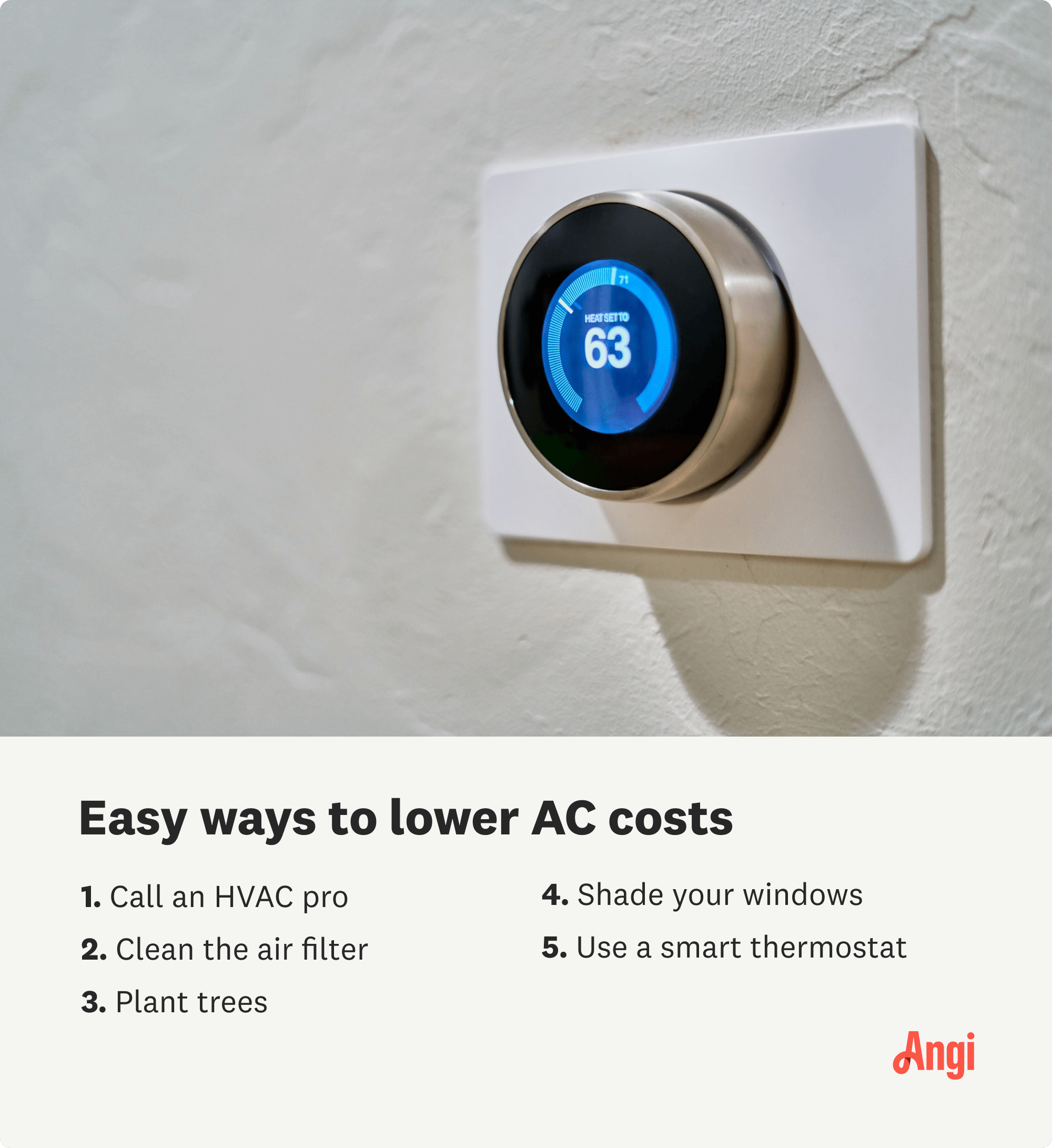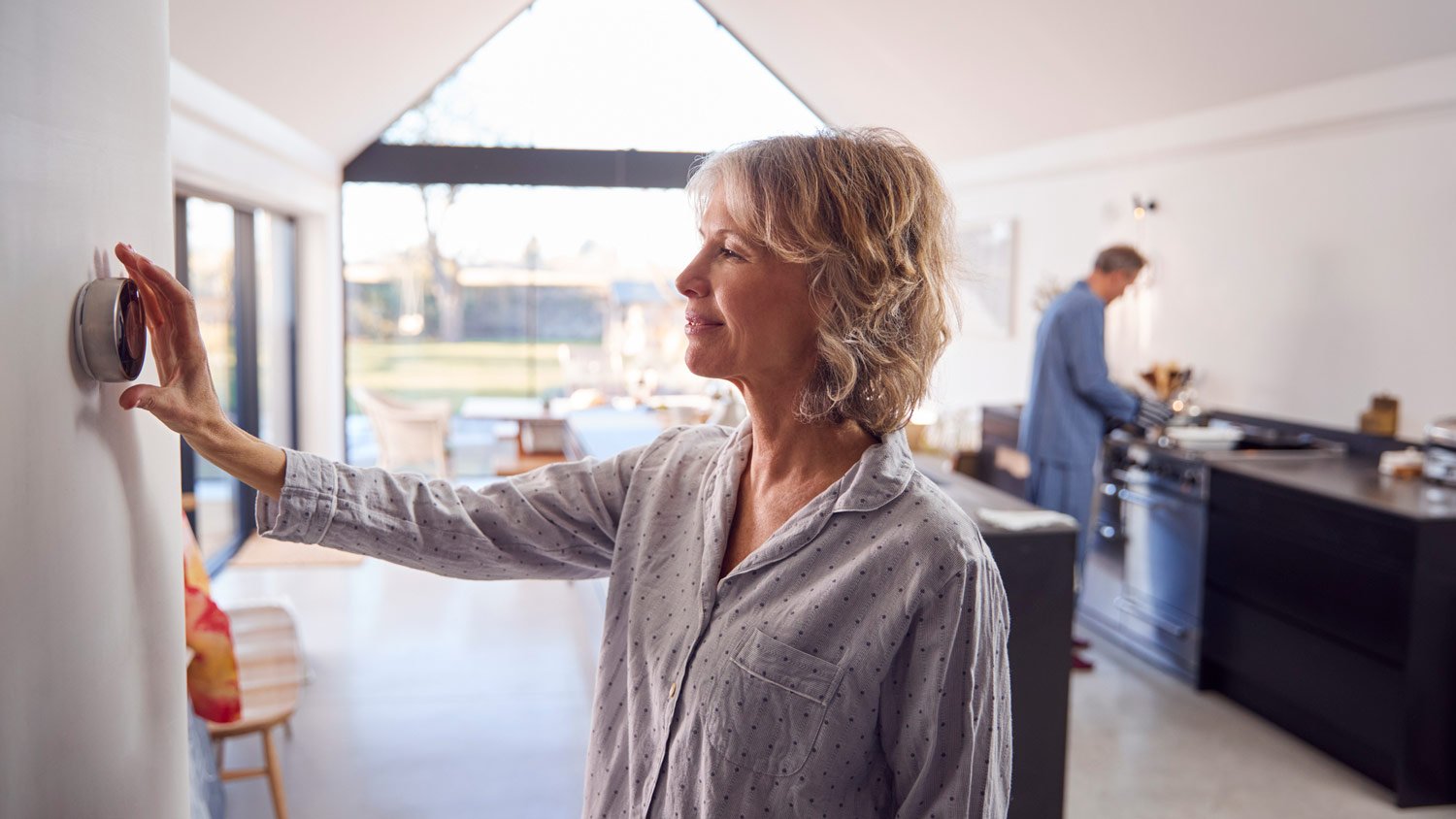13 Cool Tips to Reduce Air Conditioning Costs This Summer
Keep your home cool and your bank account happy


Air conditioning is certainly one of the best inventions ever, allowing us to relax during the summer instead of melting down into a puddle. However, keeping cool during the hotter months puts a hefty dent in the utility bill. Luckily, you can follow these 12 tips for reducing air conditioning costs.
1. Schedule a Maintenance Call

Regularly servicing and maintaining your HVAC system saves you on monthly energy bills and helps prolong the life of the unit. Contact a local HVAC contractor for a checkup late in spring or early in the summer, so they resolve any issues before your home gets slammed with ultra-hot temperatures. A qualified pro pays special attention to efficiency, ensuring your system works even on the doggiest days of summer. It's a good idea to perform this maintenance check every year, especially if your HVAC system is over five years old.
2. Clean or Change Out the Filters
Dirty, misaligned, or incorrect-sized air filters increase energy consumption and, ultimately, lead to damage throughout your air conditioning system. According to Energy Star, check your HVAC system's air filter every month, especially during the summer months when the system gets more use. During your monthly air filter checks, look for an accumulation of debris, dust, dirt, and other nasties. Clean the filters according to the manufacturer’s instructions or replace them. Energy Star recommends filter replacements every three months.
Also, ensure you have the right filter installed for your system and that it's installed correctly. The same goes when buying replacement filters. Only purchase filters approved for your unit. Find this info via a quick web search, or check the instruction manual.
3. Invest in a Programmable or Smart Thermostat

Thermostats have come a long way since the days of the cheap-looking white box with the jiggly little lever on the bottom. Modern thermostats save money on your utility bill by giving you complete control over how and when you use your AC. There are a couple of levels here worth considering. First, there’s your standard programmable thermostat that gives ultra-precise digital control over your desired temperature.
For real savings, however, consider purchasing a smart thermostat. These modern marvels let you remotely control the temperature from just about anywhere, so if you forget to turn up your AC when the house is empty, just head to the app and make any necessary changes on the fly. According to the Smart Energy Consumer Collaborative, this surgical approach to air conditioning leads to massive savings over time, up to 15%.
4. Utilize Window Shades and Coverings
The best offense is the best defense, so why not eliminate the need to run your AC continuously by leveraging your window shades and coverings? The hot sun, after all, easily pokes through uncovered windows to thoroughly bake the interior of your home. Cover as many windows as possible with shades, UV-blocking blinds, or anything else you have on hand to save some bucks during the summer months. Of course, leave one sunny window for the cat.
5. Run Your AC at the Right Times
Save on monthly energy bills by simply running the AC at the correct times. The best time to run your air conditioner is in the morning, as it allows your system to efficiently cool the home before the extreme afternoon heat sets in. Also, turn the system off when you leave the house for an extended period, as long as pets aren't a concern. Turning the unit off while you sleep is also a good money-saving option, especially if you live somewhere that cools off significantly at night.
6. Avoid Unnecessary Heat
Avoid heat-producing appliances during the day, including the oven, dishwasher, dryer, and any other appliance that uses large amounts of energy, thus dissipating heat into the air. Hold off on these tasks until the evening if possible, especially any involving the oven or dryer. In other words, wait until nightfall to tackle those chocolate chip cookies for the summer bake sale. Regulating unnecessary heat keeps your AC unit operating efficiently, saving money in the long run.
7. Seal Up Those Leaks
The name of the game with nearly all these tips is amping up the efficiency of your AC unit. Well, nothing spoils efficiency like leaks along your window frames, your doors, and even on your ductwork. Take the time to seal up these areas. Check the weather stripping around the windows, replacing if necessary, and do the same for front doors, back doors, and any basement or attic entrances. If you suspect air is leaking from any other sources, seal that up as well.
As for ductwork, that yearly service call should find any leaks along the ducts throughout the HVAC system. Properly sealed ductwork increases HVAC efficiency by up to 20%, according to Energy Star.
8. Maintain Proper Ventilation and Airflow
An AC unit is only as good as its ventilation and airflow, so help it along by keeping ducts and vents open throughout the home. Avoid placing furniture or large appliances in front of vents to help ensure the proper airflow of cold air. Once in a while, check the vents for debris buildups, dust bunnies, and the like, cleaning if necessary. Maintaining excellent ventilation and airflow goes a long way in reducing utility costs, as your system requires less energy to cool down your home. Efficiency is key.
9. Plant Trees and Shrubs

This is more of a long-term solution as trees take a while to grow. But planting trees and shrubs in front of the windows of your home provides a natural way to save money on that monthly energy bill. Consider trees and shrubs another layer of protection to stop direct sunlight before they hit your windows. Try a variety of heights to account for the different angles of the rising and setting sun, and opt for trees that shed during the winter months. You’ll need the sunlight then.
10. Clean the Coils and Outdoor Condenser
Keep your central AC unit humming along by regularly cleaning the condenser coils and clearing debris away from the outdoor condenser unit. It doesn't take long for clogs and obstacles to impede air conditioning performance seriously, resulting in beefier energy bills. Perform these regular maintenance tasks every month or as needed. Also, if you hide your AC unit, don't use a fully enclosed structure or place anything overhead. An air conditioner needs ready access to, well, air.
11. Don’t Forget Fans
Fans are a great way to cool your space on the cheap. Whether you go for an ultra-powerful whole-house fan or just a series of basic ceiling and stand fans, your AC unit appreciates the added assist.
On temperate days, get by with just the fans to really maximize those savings. Modern ones are quiet and easy on the bank account. Having fans at the ready lets you preserve your air conditioner for the hottest days, so you won’t waste money on “merely annoying” days.
12. Update Your System (If Needed)
If your AC is getting a bit long in the tooth, 10 years or older, consider replacing it with a newer, high-efficiency model. These modern ACs are built from the ground up to reduce monthly energy costs, prioritizing efficiency and overall performance. Summer weather is extreme and lasts for months, so upgrading your home cooling equipment is a great way to cut your annual energy bill. Additionally, companies often offer factory rebates and robust financing options during the summer months.
13. Insulate Your Attic
While you might associate insulation with keeping your home warm during the winter, having the proper insulation can help you keep your air conditioning costs reasonable during the summer. Hot air from outside can seep into your home through your attic if it’s not adequately insulated, essentially making your air conditioner work more than it should. Contact an insulation pro near you to determine if your insulation is sufficient in your attic or if you need to add more.





- Furnace Repair
- Air Conditioning Repair
- HVAC Repairs
- Furnace Installation
- Wood & Pellet Stove Repair
- Dehumidifier & Humidifier Repair
- Heat Pump Companies
- Swamp Cooler Repair
- Wood Stove Services
- HVAC Companies
- Commercial A/C Repair
- Geothermal Installation
- Air Conditioning Installation
- Boiler Repair
- 24 Hour Furnace Repair
- Geothermal Repair
- Heat Pump Repair
- Humidifier Installation
- Thermostat Repair
- Thermostat Installation
- Nest Installation
- Heating & Cooling
- Heating Repair
- Furnace Cleaning
- Furnace Tune-Up
- HVAC Technicians
- Subcontractors
- Furnace Maintenance
- Plumbing & Heating Companies
- Wood Stove Inspection
- Mini Split Installation
- Wall Heater Repair
- Duct Installers
- 9 Summer HVAC Tips to Stay Cool and Save Money
- 10 HVAC Secrets That Can Help You Boost Efficiency and Save Money
- 10 Chill Ways to Improve Air Conditioner Efficiency in Your Home
- Why Annual Air Conditioner Servicing Matters
- 9 Energy-Efficient Ways to Cool a Home
- What Size AC Unit Do I Need for My Home?
- What Is the Best Temperature to Set Your Air Conditioner to in the Summer?
- Adding Central Air to Your House: Can You Install AC in Your Home?
- 5 Reasons Your AC Is Freezing Up and How to Fix It
- HVAC Seasonal Maintenance: 11 Tips to Keep Your System Running Strong















